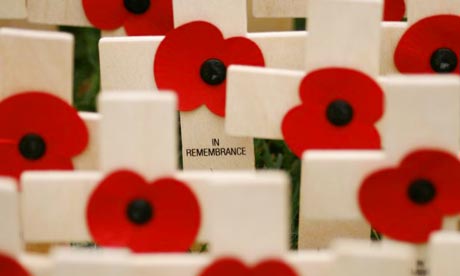
Paul Dowswell is an author of historical fiction for children, including the second world war novel Auslander.
His latest book, Eleven Eleven, set during the first world war, features three teenagers: Will Franklin is a young English boy pretending to be 18 so that he can fight for his country. Axel Meyer is a German teenager proud to be part of the Imperial Army but scared at the same time. Eddie Herts is a US pilot from a privileged background who is about to learn that war is a great leveller. The three boys' lives collide as they fight for survival on the Western Front.
1. The Great War and Modern Memory by Paul Fussell
This is one for older readers, but Paul Fussell's text is accessible and moving, despite his academic background. It's especially good at explaining the awful gulf between the expectations of the keen young recruits and the dreadful reality that awaited them. I found the passage on the use of "heroic" language especially thought-provoking: the dead are "the fallen", a horse is "a steed", the enemy is "the foe", private soldiers are "plucky", and officers are "gallant". An echo of such language still feeds into official war reporting and ought to make anyone who hears it wary.
2. Testament of Youth by Vera Brittan
Vera Brittan's classic account of her young adult life torn apart by the death of her fiancé, brother and two close male friends, attracted some ridicule. Her flinty snobbery makes her a difficult subject to entirely warm to, but it takes a hard heart not to be moved by her suffering. The scene where her dead fiancé's parents receive a package from France containing his mud caked uniform is heart-breaking, as is the passage at the end of the book where her post-war Oxford University contemporaries, who are younger and suffered far less from the conflict, mock her solemn character in a theatrical review.
3. The First World War by AJP Taylor
It saddens me when school kids tell me history is "booooring" and books like this are an antidote. Although it is now considered a bit out of date, Taylor's classic account is immensely readable and the copious illustrations, often accompanied by a wry caption, complement his text admirably. I was hooked from the start when Taylor tells us the Archduke took his beloved wife to Sarajevo because she was scorned in Vienna as not being posh enough for the Imperial Habsburgs and was not permitted to take part in court ceremonies. The trip to Bosnia was an opportunity for her to do something "official" with him and resulted in both their deaths.
4. Death's Men by Denis Winter
Winter was a school teacher for 20 years. His classic account of the lives of ordinary British soldiers is partially based on his own interviews with the dwindling band of survivors. It's a raw, haunting read that puts you directly into the shoes of the men who rushed to volunteer at the start of the war.
5. Up the Line to Death War Poets 1914-1918 edited by Brian Gardner
I put this in non-fiction because these poems are as real as any eye-witness account. Who can fail to be moved by Wilfred Owen's former sporting hero, now wheel-chair bound, who "noticed how the women's eyes, passed from him to the strong men that were whole". And who now sits alone in his hospital room fretting: "…how cold and late it is. Why don't they come to put him to bed. Why don't they come?" Or the burning anger of Siegfried Sassoon, home on leave and sickened by the jolly music hall propaganda for the war, fantasising: "I'd like to see a Tank come down the stalls, lurching to rag-time tunes…"
6. The Accrington Pals by William Turner
When the Accrington Pals went into action of the first day of the Somme, 584 out of 720 of them were scythed away, a fraction of the 20,000 killed on that terrible morning, but an appalling number for a small Pennine town. Turner's simply designed book lays out the full horror of the flawed thinking behind the "Pals Battalions" strategy, where men from the same town all served and died together, with lists of casualties and photographs from local archives.
7. The World War One Sourcebook by Philip J Haythornthwaite
An indispensable miscellany of everything you need to look up about the war – from casualties to potted biogs of generals and politicians, weapons and handy summaries of every nook and cranny of the fighting.
8. Aces High: War in the Air over the Western Front by Alan Clark
The Tory lothario and arch diarist wrote several magnificent military histories (not least Barbarossa). His account of the Great War's most novel form of warfare, fighter planes, is a vivid glimpse into an unbelievably dangerous world were half the pilot fatalities occurred in training. There were 5,000 British pilots at the end of the war. 9,000 had already lost their lives.
9. 1914-18 Voices and Images of the Great War by Lyn Macdonald
Nothing brings the war more vividly alive than eye-witness accounts and Lyn Macdonald does a superb job selecting from all aspects of the conflict. I'll never forget the battle-worn soldier "staring stupidly at the filthy exhausted men who slept around me", and lying down to rest in a summer forest, filled with "a dull wonder that there could still be flowers in the world".
10. The Great Silence by Juliet Nicolson
This shines a light on an area of our history that is rarely thought about – the years immediately following the war. Nicolson's account of the choosing, and burial of The Unknown Warrior is haunting, as are the chapters on the treatment of amputees and the men who had suffered horrendous facial injuries.

